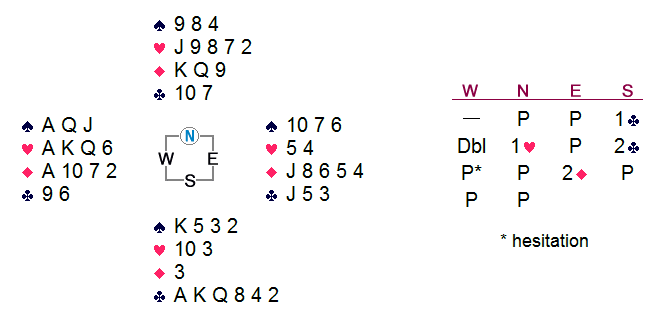

 |
 |
Sacramento, You Can Do Better
At the recent local sectional, one player, two directors, and three members of an appeals committee all insulted themselves in grand fashion:

When east balanced with 2♦ after partner's hesitation, the director was properly summoned. I am told that east made some indignant comments about being accused of cheating. That clear violation of the proprieties should have been censured, but no. Instead, the director left the table to consult the head honcho, who apparently advocated "no action: the score stands."
Well, I'm sorry, folks, but that just doesn't get it. Here is the relevant quote from the 1997 Lawbook:
"Law 73, Communication Section F: Violation of Proprieties
When a violation ... results in damage to an innocent opponent,
1. if the Director determines that a player chose from among logical alternative actions one that could demonstrably have been suggested over another by his partner's remark, manner, tempo, or the like, he shall award an adjusted score."
This means that, unless the director judged at the table that no alternative action by east was at all plausible, she was mandated by law to adjust the score. That was not done.
Since east took nine tricks in his 2♦ contract, and that result
proved better than defending 2♣ for a one-trick set,
the North-South pair naturally appealed the result. The committee was
comprised of a local Unit official, a highly experienced local club director,
and another highly experienced and well-known player. These gentlemen
unanimously upheld the director's non-ruling, allowing the score to stand.
Although I was not privy to all the discussion at the hearing, I was subsequently
informed that the director had failed to acquaint the participants with the pertinent
regulation — the aforementioned Law 73.
This is the so-called Law of Logical Alternatives, not so affectionately
known by some as "LOLA" (whatever LOLA wants, LOLA gets). Albeit
imperfect, the intent of the law is clear: a player is disallowed any
favorable action that could have been suggested by unauthorized information.
No ethical judgment is made, no mind needs to be read, and no self-serving
statement needs to be evaluated. By law, any action that might have been
suggested simply is canceled. End of story.
Or so it should have been, but this committee re-wrote the ending. Three possible scenarios spring to mind:
What do you think? Knowing that the opponents figure to own
the balance of power — possibly as much as 23-24 hcp, and
knowing that partner had declined a convenient opportunity to show a strong hand,
would you not consider a pass as an option?
Several days after the event, I discussed the matter with one of the
committee members, who readily acknowledged that a pass would have been
perfectly reasonable; yet this statement patently contradicts his vote in the
committee. This fact affirms the likelihood of scenario #1 —
that the committee members had no clue as to what they were supposed to be doing,
because the director failed to provide proper guidelines. Two of the members,
however, had fairly recently served on at least one other committee involving
much the same issue; so they had no excuse.
And that's the news from the Land of Rotten Officiating. Sacramento, you can do better.